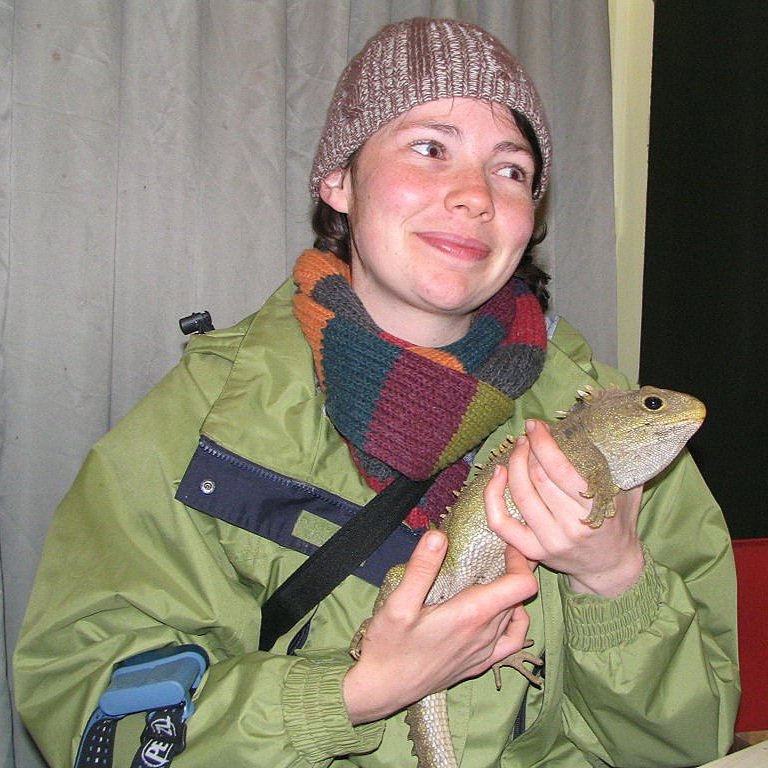S&P’s wildlife spotlight: the tuatara
The tuatara (Sphenodon punctatus) is a truly unique species - and an easy pick for our wildlife spotlight this month!
Yes - they look like a lizard - but they are not! They instead represent a distinct lineage of reptiles that diverged from the lizards and snakes about 220-250 million years ago. And they only occur here in Aotearoa!
We have a special connection to tuatara; Steph carried out her PhD on them many years ago on Takapourewa (Stephens Island), so when it came to our block print designs - the tuatara was a high priority! Steph’s PhD focused on the parasites of tuatara; at the time almost nothing was known about the ticks, mites and blood parasites that infected them. So Steph endeavoured to find out more about these parasites, their lifecycles and how they get transmitted from one tuatara to another. So - of course, in both of our prints - if you look really closely, you will actually see a wee tuatara tick (Amblyomma sphenodonti) on both of them! These ticks are host-specific - being found only on tuatara. So, if we consider that the tuatara is unique and worthy of conservation, then perhaps we should also consider the same for their unique parasites! A controversial opinion maybe, but one that is garnering more support in the field of conservation biology as we look towards more holistic conservation of not just single species, but self-sustaining ecosystems.
A young Steph with a tuatara on her first field trip for her PhD.
So, what makes tuatara so special? Where do we start! They are incredibly long-lived; it is a hard thing to measure, but estimates sit at around 100 years old, and there is the famous Henry who is thought to be over 110 years old! When you live for that old, you can afford to do everything slowly! Tuatara are thought to take at least 10-20 years to become sexually mature, and - because of their mating system - which is based on male body size (larger males are more dominant and able to monopolise a female partner), it is probably quite a while until they reach a size where they can be competitive for a mate! Mating (which is a long, drawn out process on it’s own!) occurs in February-March, and females usually lay their eggs in nests in November. These eggs can take up to 12-15 months to incubate!! So everything takes a rather long amount of time!
This leads to another interesting aspect of their biology - they have temperature determined sex, but unusually - unlike most other reptiles that have this method of sex determination, warmer temperatures produce more males, at a very precise threshold; nest temperatures below 21C produce all females and nests above 23C produce all males. In our warming climate, you can quickly see how this might become a problem; if nests experience warmer temperatures - then we will start to see a shift in the sex ratio towards more males - which is a problem for the reproductive capacity of the population, since females only reproduce once every 2-4 years in the wild. We don’t yet know if tuatara can change their nesting behaviour to pick cooler nest sites to help compensate for this temperature shift, but the problem is that with such long generation times - it will be a long time before we really know what impact this has on them.
To help mitigate this - tuatara have been translocated to Ōrokonui Ecosanctuary, here in Dunedin! The hope is that with a cooler climate down here in the deep south, it will provide cooler nesting conditions and help mitigate against the warming climate in the longer-term. So far so good - hatchlings have been found at Ōrokonui, which demonstrates they are successfully breeding - but again, with such a slow lifestyle - it will take a while until we fully know whether this mitigation will be successful. In the meantime, it is an incredible privilege to have tuatara ‘just down the road’!
Tuatara in te reo Māori means ‘peaks on the back’ - and this taonga (treasured) species obviously holds a special place for Māori, who act as kaitiaki (guardians) for this species. Tuatara themselves are viewed by some iwi as kaitiaki of knowledge and are culturally very significant.
For the month of May (2022) - we will have 10% off all our tuatara products in our Etsy shop if you use the coupon code TUATARA10 - shop now!


